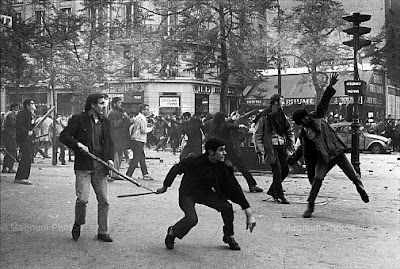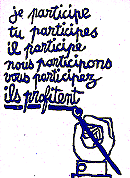Remembering the Sixties
From the desk of Michael Huntsman on Wed, 2008-02-13 14:36
One of the dafter assertions is that if you can remember the sixties, you weren’t there. Some of us who managed to get through them without ever having one’s mind bent or consciousness altered by drugs remember them all too clearly, often with little affection. Others, however, were definitely not there or were definitely too young to notice. Rod Liddle comes to mind.
Rod, erstwhile member of the Socialist Workers Party, wrote yesterday in the Daily Mail of the year 1968 as if he was there as a mature adult, or at least as a switched on youth in his mid-teens. He was in fact born in 1960 and whilst he might remember a few things of that time, I doubt it was quite at first hand as he would have you believe; rather he has had a ramble through the history books.
That said, 1968 was a rotten year, although curiously it was the only year since 1945 when a British Serviceman was not killed on active service, falling as it did between the twin stools of the end of Empire and the beginning of the age of terror – Aden was our last serious fighting retreat from Empire in 1967 and ‘The Troubles’ in Northern Ireland did not begin until 1969.
It was certainly a year which helped form my politics as I suspect it did many of my contemporaries. Roy Jenkins had just finished his first stint as Home Secretary, ushering in a series of ‘liberal’ reforms which effectively gave birth to the modern ‘permissive’ age, the wreckage of which we can survey at our leisure forty years on but are unable to repair because our political masters have either made it impossible or simply stand in our way.
The crushing of the Prague Spring had an enormous impact. It told you all you needed to know about the practice of communism and helped many to make up their minds about the nature of socialism generally. That other great spasm of 1968, the events of may in France which saw the Third Republic roll over to its students and General de Gaulle scuttle off to the Black Forest to plead for the support of his generals, was far less seminal than many have claimed, though it did for France in a way that still inhibits her now.
I have never bought into the theory, however, that the events of May 1968 were a spontaneous upwelling of revolt by Europe’s students. I reckon it was fomented by the Communists to distract the West during its problems in Czechoslovakia. We had family friends in Lyon. The father was head of a substantial manufacturer of large trucks, vans and military vehicles manufacturers there and was being briefed regularly on events by the Direction de la Surveillance du Territoire (DST), France’s MI5, and what lay behind them, well before May.
I spent Easter 1968 with them as I was supposed to get myself fluent in French and recall being told that industrial trouble was even then being stirred up by the Communists to help out their masters in Moscow as they grappled with Alexander Dubček and events in Prague. I had a very good lecture from Monsieur on how the Communists controlled the Confédération Générale du Travail (CGT) and exercised industrial and political power disproportionate to their numbers. I remember visiting the main factory to see their trucks being built and was forcibly struck by the tense air of hostility of the workers towards the management and by the singular fact of how slowly everything seemed to be happening.
Such an education enabled me to see more clearly how our own Unions functioned, what their agenda was and how the hard left and communists dominated and manipulated them despite being numerically even smaller than their French counterparts and having no democratic base to speak of. Some of those who were cutting their class-struggle teeth back then and in the years that lead up to the time when Margaret Thatcher emasculated them, are, of course, now in power under Gordon Brown. The latter is himself quintessentially a creature of the late 1960s which is why so much of his politics have that weird late 60s, early 70s feel to them.
When at their apartment in Lyon and at their house in the country, Monsieur had a round-the-clock armed guard from the DST which certainly got my attention. When I went back in mid-summer they were still very nervous, though the troubles had come not, as expected, from the workers, but the students. Notwithstanding all the troubles, the family cleared off to the country in early July by which time de Gaulle had won elections and the worst was over.
One recalls the events of May 1968 as much for its meaningless sloganising as anything. I remember two in particular: the title of this piece and this gem (which appealed to me because I was learning French at the time and which has a certain resonance now concerning our porcine political class):
I take part
you take part
he takes part
we take part
you all take part
they take advantage.
Concerning one matter Liddle is entirely wrong for he writes:
Britain experienced some pretty bleak years in the last century, years you'd want to forget. 1940, for example, when - on the brink of defeat - we stood alone against Hitler.
One begs to differ on the issue of 1940 being a year that you would want to forget. It was indeed a ‘bleak year’ but it was a year which showed the British race to advantage. The political elite had made a real hash of the preceding few years and was now replaced by a new set of characters from across the spectrum of politics who demonstrated that, when needs must, differences could be put aside for the greater good. And our people, for the most part, put aside personal ambitions and desire in order to contribute to the commonweal. In standing fast for the next year and a half we drew on some of the best features of our people’s character in order to pull together. It was year that earnt us a long-term place at the High Table.
The late 60s was a glum sort of a time, in reality. Those having ‘fun’ were for the most part dopeheads who would pay for their habits in spades in the years to come. We lost a lot of ground in the war against drugs at that time, not least because of William Rees-Mogg’s misguided casting of Keith Richards and Mick Jagger as a butterflies ‘broken on the wheel’: it would have been far better if the then Court of Appeal had taken the case of these two and used it as a guideline sentencing case to predicate that possession of Class ‘B’ drugs merited for everyone, regardless of previous record, a short custodial sentence for a first offence. This would have defused the notion that they were being picked upon because of who they were rather than for the crimes they had committed.
Many of our modern ills can indeed be traced to this period. Liddle reminds us that it was Liberal ‘Democrat’ Shirley Williams who was the effective midwife to the Comprehensive School System which, though it has its gems, has been a ‘lowest common denominator’ sort of education system rather than the ‘highest common factor’ that we should have and deserve.
Still, that is all water under the bridge and we have managed some departures from the inevitable decline which we foresaw in 1968. But in other ways we still have a mountain to climb to undo the pernicious evils of the late 1960s, so those of us who think we might do a little better will, in Churchill’s immortal phrase, ‘keep buggering on’.



@traveller
Submitted by Atlanticist911 on Wed, 2008-02-13 18:00.
Is kappert there? No,then I'll continue.
Just wait until the subject reads,"Al Gore claims Global Warming is responsible for the creation of all the Rod Liddles of this world".Kappert is sure to agree.At which point I'll post a link to,"Ice in the sun" @ youtube ...3QU.
Shhhhhh.....I think kappert's coming back.We'll talk again.
Veils # 2
Submitted by Atlanticist911 on Wed, 2008-02-13 15:52.
@traveller
Mustn't leave kappert out of the loop,must we?
https://www.youtube.com/watch?v=Eu5N1xtIOS8
@ Atlanticist911
Submitted by traveller on Wed, 2008-02-13 17:17.
There is not much chance you will, I am sure.
Veils
Submitted by Atlanticist911 on Wed, 2008-02-13 15:26.
"Black veils of melancholy falling on me
Blach veils keep shadowing my mind
Black veils that make my mind seem small...
I see you with my eyes closed getting closer
and closer to me
I open my eye up and you're not there
It's all in my mind.
Status Quo song lyrics sung to the tune of
https://www.youtube.com/watch?v=wr5UouAts8o
All very confusing,wasn't it,Rod?